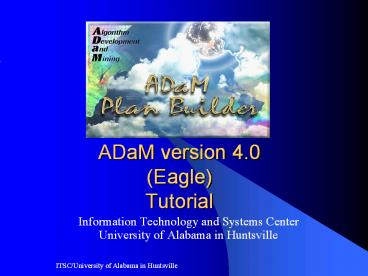ADaM version 4.0 (Eagle) Tutorial - PowerPoint PPT Presentation
Title:
ADaM version 4.0 (Eagle) Tutorial
Description:
An ARFF (Attribute-Relation File Format) file is an ASCII text file that ... Instances described by attributes and a class label (4 cancerous, 2-non-cancerous) ... – PowerPoint PPT presentation
Number of Views:66
Avg rating:3.0/5.0
Title: ADaM version 4.0 (Eagle) Tutorial
1
ADaM version 4.0(Eagle)Tutorial
- Information Technology and Systems Center
- University of Alabama in Huntsville
2
Tutorial Outline
- Overview of the Mining System
- Architecture
- Data Formats
- Components
- Using the client ADaM Plan Builder
- Demos
- How to write a mining plan
3
ADaM v4.0 Architecture
- Simple component based architecture
- Each operation is a stand alone executable
- Users can either use the PlanBuilder or write
scripts using their favorite scripting language
(Perl, Python, etc) - Users can write custom programs using one or more
of the operations - Users can create webservices using these
operations
4
Versatile/Reusable Mining Component Architecture
of ADaM v4.0 (Eagle)
Exploration/Interactive Applications
Production/Batch
Interface(s)
Custom Program
E
ADaM PLAN BUILDER
A1
E
A3
E
A
Distributed Access
Driver Program
DP
Web Service Interface
WS
ESML Description
E
Virtual Repository of Operations
3rd Party
DP
WS
DP
WS
DP
WS
DP
WS
WS
DP
E
A1
A2
A3
An
A
E
E
E
E
ADaM V4.0
5
ADaM Data Formats
- There are two data formats that work with ADaM
Components - ARFF Format
- An ARFF (Attribute-Relation File Format) file is
an ASCII text file that describes a list of
instances sharing a set of attributes - Binary Image Format
- Used to write image files
6
ARFF Data Format
- ARFF files have two distinct sections. The first
section is the Header information, which is
followed by the Data information. - The Header of the ARFF file contains the name of
the relation, a list of the attributes (the
columns in the data), and their types. An example
header on the standard IRIS dataset looks like
this - _at_RELATION iris
- _at_ATTRIBUTE sepallength NUMERIC
- _at_ATTRIBUTE sepalwidth NUMERIC
- _at_ATTRIBUTE petallength NUMERIC
- _at_ATTRIBUTE petalwidth NUMERIC
- _at_ATTRIBUTE class Iris-setosa,Iris-versicolor,Iris
-virginica - _at_DATA
- 5.1,3.5,1.4,0.2,Iris-setosa
- 4.9,3.0,1.4,0.2,Iris-setosa
- 4.7,3.2,1.3,0.2,Iris-setosa
- 4.6,3.1,1.5,0.2,Iris-setosa
7
Binary Image Data Format
- Contains a header with signature and size (X,Y,Z)
followed by the image data - Sample code to write header
- int header4
- header0 0xabcd
- header1 mSize.x
- header2 mSize.y
- header3 mSize.z
- if (fwrite (header, sizeof(int), 4, outfile)
! 4) - fprintf (stderr, "Error Could not write
header to s\n", filename) - return(false)
8
ADaM Components
- Components arranged into FOUR groups
- Image Processing (Binary Image format)
- Contains typical image processing operations such
as spatial filters - Pattern Recognition (ARFF format)
- Contains pattern recognition and mining
operations for both supervised and unsupervised
classification - Optimization
- Contains general purpose optimization operations
such as genetic algorithms and stochastic hill
climbing - Translation
- Contains utility operations to convert data from
one format to another such as image to gif
9
ADaM Mining Plan
- A sequence of selected operations
- The ADaM Plan Builder allows the user to select
and sequence Mining Operations for a given
problem - One could use any scripting language to write a
mining plan
Opn 3
Opn1
Opn 2
10
ADaM Plan Builder Layout
Operation Menu contains the list of operations
one can select
- Plan Menu allows one to
- Create a new plan or Load an existing plan
- Remove a newly-added operation from a plan
11
ADaM Plan Builder Layout
Panel where Mining Plan can be viewed either as
a text or a tree
12
ADaM Plan Builder Layout
All the parameters needed for the Operation are
described here
13
ADaM Plan Builder Layout
Utility function to create samples for training
14
Demo!
- Training a classifier to identify cancerous
breast cells using a Bayes Classifier - Workflow
- Brief explanation on Bayes Classifier
- Sampling the data (training and testing set)
- Training the Bayes Classifier
- Applying the Bayes Classifier
- Interpretation of the Results
15
Bayes Classifier
STARTING POINT BAYES THEOREM FOR CONDITIONAL
PROBABILITY
END POINT BAYES THEOREM CLASSIFIER FOR
SEGMENTATION
TERM 1 PROBABILITY OF DATA POINT X BELONGING
IN CLASS ( I )
TERM 2 PROBABILITY OCCURRENCE OF A CLASS BASED
ON NUMBER OF CLASSES USED IN SEGMENTATION
TERM 3 NORMALIIZATION TERM TO KEEP VALUES
BETWEEN 0 -1
TERM 4 PROBABILITY THAT DATA POINT X BELONGS TO
CLASS (I)
16
Data File
- Instances described by attributes and a class
label (4 cancerous, 2-non-cancerous) - _at_relation breast_cancer
- _at_attribute Clump_Thickness real
- _at_attribute Uniformity_of_Cell_Size real
- _at_attribute Uniformity_of_Cell_Shape real
- _at_attribute Marginal_Adhesion real
- _at_attribute Single_Epithelial_Cell_Size real
- _at_attribute Bare_Nuclei real
- _at_attribute Bland_Chromatin real
- _at_attribute Normal_Nucleoli real
- _at_attribute Mitoses real
- _at_attribute class 2, 4
- _at_data
- 5.000000 1.000000 1.000000 1.000000
2.000000 1.000000 3.000000 1.000000
1.000000 2 - 5.000000 4.000000 4.000000 5.000000
7.000000 10.000000 3.000000 2.000000
1.000000 2
17
Demo!
18
Evaluating Results (Training Set)
- Confusion Matrix
- 0 1 lt--- Actual Class
- --------------------------------------
- 0 214 3
- 1 14 110
- ------ Classified As
- POD 0.973451
- FAR 0.112903
- CSI 0.866142
- HSS 0.890194
- Accuracy 324 of 341 (95.014663 Pct)
Probability of Detection
False Alarm Rate
Skill Scores
Overall Accuracy based on Confusion Matrix
19
Evaluating Results (Test Set)
- Confusion Matrix
- 0 1 lt--- Actual Class
- --------------------------------------
- 0 205 3
- 1 11 123
- ------ Classified As
- POD 0.976190
- FAR 0.082090
- CSI 0.897810
- HSS 0.913185
- Accuracy 328 of 342 (95.906433 Pct)
Probability of Detection
False Alarm Rate
Skill Scores
Overall Accuracy based on Confusion Matrix































